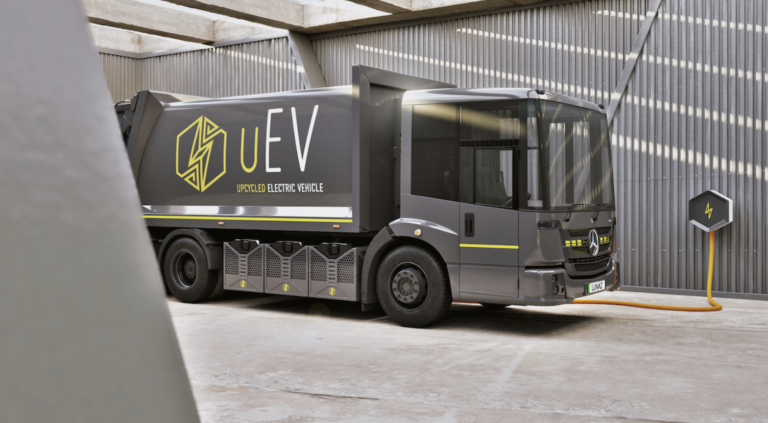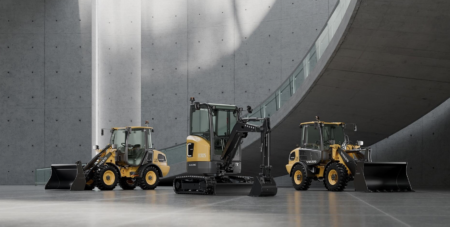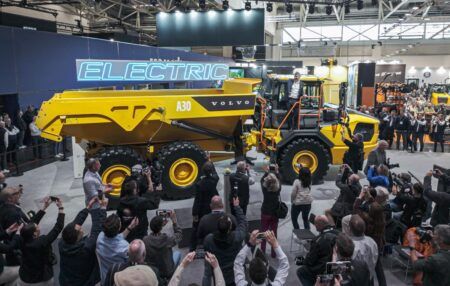Lunaz has unveiled its first Upcycled Industrial Electric Vehicle (UEV), creating a new classification of electric vehicles (EVs).
A UEV by Lunaz represents a dramatic carbon and cost saving versus replacing current vehicles with new electric equivalents. Upcycling, remanufacturing and electrification will play a vital role in plotting a more economically and ecologically viable course to global fleet decarbonisation. This also addresses significant capacity deficits versus demand for the production of new EV industrial vehicles.
This approach breaks the cycle of replace-with-new that defines current dynamics in the global automotive industry. Many industries around the world including aerospace, rail and even fashion are embracing the enormous potential of upcycling to save millions of tonnes of embedded carbon that would otherwise be scrapped. Lunaz is taking an approach proven in the remanufacturing and electrification of pinnacle passenger vehicles through its Lunaz Design classic cars business. It applies this methodology to an industry with a global requirement to transition sustainably to clean-air powertrains at pace and at enormous scale.
An environmental audit commissioned by Lunaz and performed by leading scientists and engineers confirmed that more than 80% of embedded carbon over total lifetime is saved when upcycling rather than replacing an existing refuse truck with a new EV equivalent. Lunaz will deliver a fully upcycled, re-engineered refuse truck built to a near zero-mile standard to Councils and Waste Management companies for broadly the same price as a new diesel equivalent and considerably less expensively than a new electric-powered refuse truck.
Before the diesel engine is removed and replaced with the Lunaz modular electric powertrain, every industrial vehicle that undergoes Luanz’ remanufacturing and electrification approach is fully upcycled. This includes a full bare-metal restoration. This means fleet operators are presented with a vehicle in factory new condition.
Lunaz develops all its software in-house. This ensures end-users are presented with a vehicle equipped with the latest safety and control equipment. This includes the replacement of wing-mirrors with camera equipment and latest blindspot protection through side-facing RADAR and 360 birds-eye view cameras to increase awareness of surroundings and safety of workers when manoeuvring.
Lunaz’ in-house design team will respond with a new seat design to address this issue utilising the same craft-skills that has seen Lunaz Design lead the market for the electrification of pinnacle classic cars. This extends to a full refurbishment and re-design of interior spaces to ensure the vehicle is presented in a factory-new standard and is furnished with the latest technology.
The company’s technology marries seamlessly to the vehicle’s existing systems and following up-cycling, the useful life of these vehicles is dramatically extended. This saves significant capital expenditure for public and private sector entities. This extends to the specification of battery pack sizes which can be tailored to specific routes within a Council’s requirements. For example, a refuse truck that focuses on shorter urban rounds will be specified with a smaller battery pack than its equivalent that drives on longer rural routes. This dramatically saves cost and weight versus the one-size-fits-all approach offered with new electric refuse trucks.
Lunaz UEV refuse trucks will also be specified with the latest telematics technology, meaning fleet operators can dynamically track and manage their fleets. This technology also provides significant service and maintenance benefits through an approach pioneered in the airline business. Central operators at Lunaz will be able to diagnose issues and alert council workshops to repair requirements. This will reduce fleet downtime and cost burden in servicing.
Lunaz Applied Technologies, the company’s R&D, engineering and development arm has been readying the company’s first industrial vehicle offering from its foundation in 2018. This will be remanufactured, re-engineered and electrified Mercedes-Benz Econic platform vehicles for uses including as refuse trucks, commercial hauliers and for specialist applications in off-highway settings including airports.
In total more than 1,100 UEV industrial vehicles will roll-out of the Silverstone facility every year. In embedded carbon terms this will represent an equivalent saving of the entire weight of the Eiffel Tower.





